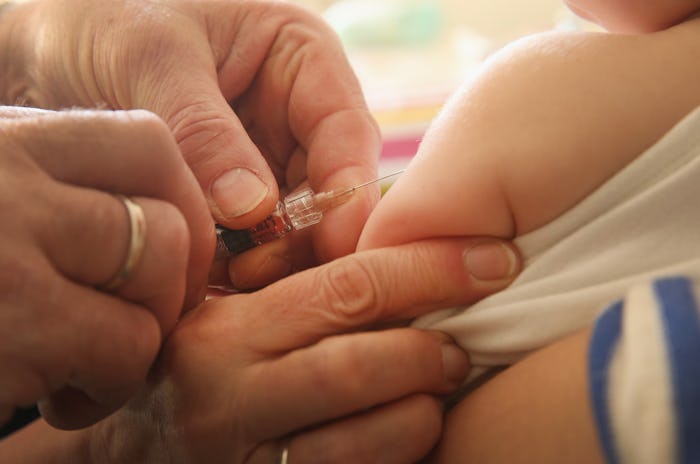News

German Kindergartens Share Vaccine Info With The Gov't
A forthcoming German law will take vaccine standards a to a new level. As of next week, legislation will ask that kindergartens report parents who won't get vaccination advice for their kids, all in efforts to control a recent uptick in preventable outbreaks. Though it seems like a drastic measure to take, the actual specifics of the law aren't as extreme as some are making them out to be. Earlier this week, a 37-year-old mother of three died of measles in the city of North Rhine-Westphalia — a terrible consequence that might have been prevented by more widespread vaccination.
First off, the measure doesn't even go so far as to require vaccination. What it does require, though, is that parents have a consult with a doctor on vaccination advice. If parents don't attend so much as a consult, there's a 2,500 euros ($2,800) fine (one that, for the record, existed before this recent law). Now, kindergartens are added into the mix; If parents don't prove to their kids' educational providers that they've had a consultation on vaccines, then the fine will be imposed. What's more, if parents refuse vaccine consultations, their children could be expelled.
According to the European Centre for Disease Prevention and Control (ECDC), lower vaccination numbers have resulted in higher measles, chicken pox, and mumps rates across the continent, but in Germany especially. German health minister Hermann Groehe asserted to Bild newspaper that "nobody can be indifferent to the fact that people are still dying of measles," and it's for this reason that the new vaccine mandates are being put in place. Germany consistently promotes vaccination to its citizens; Just this week, a court ruled that a mother must vaccinate her child in accordance with the child's father's wishes, despite her objection to the practice.
By April 16th of last year, Germany had recorded just 33 measles cases. This year, 406 cases were recorded in that same time frame, outpacing the entire year's worth of measles cases in 2016.
The ECDC's vaccination schedule recommends that children be vaccinated for the measles before they reach two years of age. Their website also reminds that "vaccines represent the most effective and cost-saving public health intervention," promoting their widespread use. In requiring parents to get educated on the utility of vaccines from their children's earliest schooling age, German lawmakers hope to see an eventual decrease in preventable cases, rather than 2017's outrageous hike in numbers.